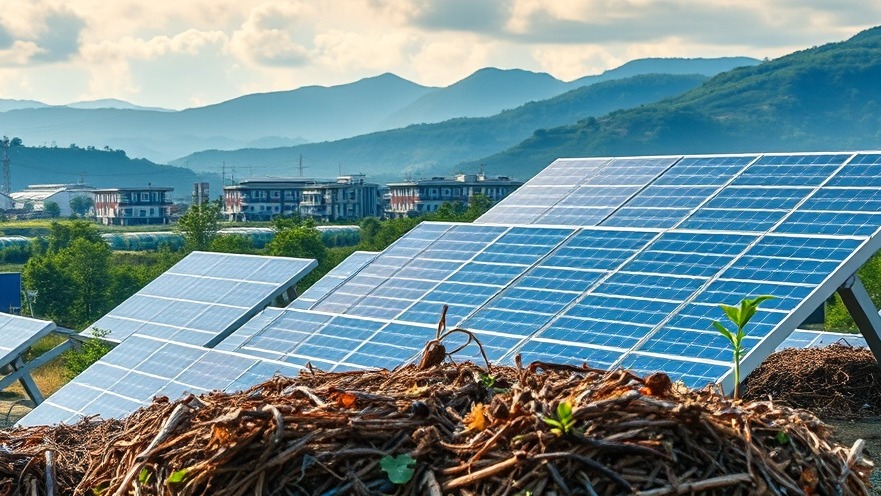
The Future of Sustainability: Trends Shaping Our Planet
As we step into 2025, sustainability is not just a trend—it's a necessity. The global landscape is rapidly changing, and industries are waking up to the urgent requirement of sustainable practices that align with economic growth and environmental stewardship. From circular economy initiatives to the latest in renewable energy advancements, several key trends are displacing outdated methods in favor of greener alternatives.
Circular Economy Initiatives: Rethinking Waste
One of the most significant shifts occurring is the embrace of the circular economy. This innovative model not only aims to reduce waste but also encourages the continual use of resources. By recycling materials and creating products designed for reuse, companies can minimize their environmental impact while also cutting costs. Think of it as a closed-loop system where waste is essentially transformed into inputs for new products, fostering efficiency and sustainability.
Regenerative Agriculture Practices: Healing the Land
In the agricultural sector, regenerative practices are gaining ground. Farmers are now applying methods that restore soil health, enhance biodiversity, and improve water cycles. This transformation goes beyond traditional organic farming; it aims to regenerate ecosystems while producing food. The shift is a recognition that agriculture can play a proactive role in climate resilience, reducing greenhouse gas emissions and increasing food security simultaneously.
Carbon Offset Programs: Investing in the Right Future
Carbon offset programs are also making headway as individuals and corporations aim to neutralize their carbon footprints. By investing in projects that reduce or capture carbon emissions elsewhere—such as reforestation or renewable energy installations—stakeholders can take responsible action against climate change while also promoting environmental technology innovations. This creates a synergy where offsetting becomes a leading strategy in corporate sustainability agendas.
Sustainable Fashion Innovations: Conscious Consumerism
The fashion industry is one of the largest polluters, and thus, sustainable fashion innovations are essential. Brands are now making strides towards ethical sourcing, reducing waste, and using non-toxic materials. Innovations like biodegradable fabrics and recycling initiatives are gaining popularity, enabling consumers to make eco-friendly choices. As awareness grows, shoppers today are more inclined to support brands that take meaningful action towards sustainability.
Green Building Technologies: Constructing a Greener Future
Architecture and construction are undergoing a monumental shift with the rise of green building technologies. Utilizing materials that are sustainable and energy-efficient practices are no longer optional; they are becoming the standard. From solar panels to energy-efficient heating systems, these technologies not only decrease the environmental footprint of buildings but also reduce operating costs—a dual benefit that is driving their adoption.
Electric Vehicle Advancements: Driving Towards Sustainability
The automotive industry is seeing a major pivot towards electric vehicles (EVs). As technology improves, electric vehicles are becoming more affordable and accessible, with a growing network of charging stations. Governments worldwide are offering incentives to encourage this transition, recognizing EVs as vital to reducing urban air pollution and dependency on fossil fuels.
Renewable Energy Solutions: Powering the Future
With a clear consensus on the need to move away from fossil fuels, renewable energy solutions such as solar, wind, and geothermal are garnering unprecedented support. Investment in these technologies is anticipated to accelerate, driving down costs and improving overall efficiency. As businesses and households increasingly invest in renewable solutions, the landscape of energy production is evolving towards a more sustainable and resilient future.
Water Conservation Technologies: A Precious Resource
As freshwater scarcity becomes a pressing global concern, water conservation technologies are stepping into the limelight. Innovations in desalination, wastewater recycling, and smart irrigation can help secure water supplies for agriculture and urban areas alike. These solutions not only serve immediate needs but also empower communities to manage this invaluable resource sustainably.
Zero-Waste Packaging: Rethinking Consumer Goods
Packaging is another area where sustainability is making significant strides. Zero-waste packaging solutions that eliminate single-use plastics are gaining traction. Companies are now seeking alternative materials that are either recyclable or compostable, demonstrating a commitment to environmental accountability. The focus on packaging reflects a growing consumer expectation for brands to act responsibly in their environmental impact.
Innovations in Renewable Energy: The Next Frontier
Lastly, advancements in renewable energy technologies are paving the way for a more sustainable future. From enhanced solar technology that improves efficiency to innovative energy storage systems, these breakthroughs hold the key to overcoming intermittency challenges associated with renewable sources. As research and development continue to progress, the potential to harness clean energy sources will expand exponentially, transforming our energy landscape.
Conclusion: Embrace Sustainability for a Brighter Future
2025 is not just a new year; it's a kickoff for sustainability practices that can revolutionize how we manage our resources and tackle environmental challenges. Embracing these trends is not merely about compliance; it's about seizing opportunities for innovation and collaboration that can lead to economic growth while preserving our planet for future generations. The future of sustainability lies in the hands of all—individuals, businesses, and governments—who can choose to create a greener tomorrow.
 Add Row
Add Row  Add
Add 




 Add Row
Add Row  Add
Add 

Write A Comment